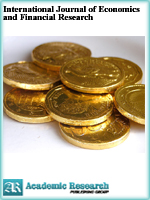International Journal of Economics and Financial Research
Online ISSN: 2411-9407
Print ISSN: 2413-8533
Print ISSN: 2413-8533
Quarterly Published (4 Issues Per Year)

Archives
Volume 5 Number 6 June 2019
International Management and Sustainable Profitability: First Bank of Nigeria Perspective
Authors: John Nkeobuna Nnah Ugoani
Pages: 159-170
DOI: doi.org/10.32861/ijefr.56.159.170
Abstract
At the early stages the area now known as Nigeria was an agricultural economy which aroused the interest of early British it’s in Nigeria’s palm produce, cocoa, groundnuts, rubber and others that were shipped to Liverpool and returned to the country as finished goods. The British governments philosophy of dual mandate encouraged the Royal Niger Company with power to administer, make treaties, charge customs dues and carry on trade in all territories in the basin of the Niger River and it’s affluent. Ahead of the withdrawal of the Charter by the British government in 1900, British business people like Jones sought for an alternative platform to promote trade between British and the area now known as Nigeria by the establishment of BBWA on March 31, 1894, with its head office in Liverpool. The bank now known as FBN has passed through the rigours of effective international management in the past 125 years and remains one of the most profitable banking enterprises on the African Continent. In the process of international management the bank produced great managers including Mr. John Major who worked at Jos Main Branch in Nigeria and later became the Prime Minister of Great Britain. 115 people participated in the study conducted through the exploratory research design. Data gathered were analyzed through the descriptive and regression statistical methods and the result showed positive correlation between international management and sustainable profitability. However, further research could be conducted to supplement the present effort including an examination of the relationship between shareholders, worth and profit before taxation in public companies in Nigeria. On the basis of the result of the study it was a recommendation that companies seeking to play in the international environment must ensure that they have competent managers to drive organizational goals.
An Assessment of the Impact of Foreign Direct Investment on Employment: The Case of Ghana’s Economy
Authors: Addo Eric Osei
Pages: 143-158
DOI: doi.org/10.32861/ijefr.56.143.158
Abstract
The literature is in respect of the fact that foreign direct investment has been a key aspect of the development strategy of most developing countries. The main objective of the study is to examine the extent FDI influence employment creation in the non-mining sector of Ghana for the period 2000 – 2016 using time series (annual) data conducted with the aid of OLS (Multiple Linear Regression) model, Autoregressive Distributed Lag (ARDL-ECM) Bounds Testing Approach and Granger-Causality test in the estimation of level relationship / cointegration and causality (respectively) between the study variables (for robustness checks). The result of this study shows that FDI has a statistically significant and a positive impact on employment growth via jobs creation in Ghana. Again, evidence shows that the study variables are cointegrated and have a long run relationship. Further robust test from Granger-causality shows no causal relationship from FDI to employment growth or from employment growth to FDI (at significance level of 5%). In addition, the study identifies factors such as wage structure, investment freedom and subsectors as important indicators influencing employment in the country. Finally, the study recommends policies to help create enabling political and socio-economic environment for FDI thereby creating more sustainable jobs and tackling the current high rates of unemployment in Ghana.
Monetary Policy: Is the Dual Mandate of the Fed Maximizing the Social Welfare?
Authors: Dr. Ioannis N. Kallianiotis ; J. Kania
Pages: 112-142
DOI: doi.org/10.32861/ijefr.56.112.142
Abstract
In this work we deal mostly with the recent (2008-present) Federal Reserve operated monetary policies, which are two unprecedented and distinct monetary policy regimes. The Zero Interest Rate Regime (2008:12-2015:11) and the New Regime (2015:12-2018:12). These different monetary policy regimes provided various outcomes for inflation, interest rates, financial markets, personal consumption, personal savings, real economic growth, and social welfare. Some of the important results are that monetary policy appears to be able to affect long-term real interest rates, risk, the prices of the financial assets, and very little the real personal consumption, personal savings, and the real economic growth during the recent period of extreme monetary policy, in which the Fed held short-term interest rates abnormally low for an extended period (2008-2015) and the present time, which keeps the federal funds rate below the inflation rate. The Fed’s interest rate target was set during those seven years at 0% to 0.25%. On December 16, 2015, the Fed started increasing the target rate by 25 basis points approximately in each FOMC meeting, from 0.25% to 0.50% to 0.75%, and presently to 2.50%. We want to explain the low level of long-term interest rates and the real rate of interest (cost of capital) in the economy. The evidence suggests that it is the Fed the main cause of the low (negative) real interest rate following the 2007-2008 financial crisis. This monetary policy was not very effective (the zero interest rate target of the Fed). It has created a new bubble in the financial market, future inflation, and a redistribution of wealth from risk-averse savers to banks and risk-taker speculators. In addition, it has increased the risk (RP) by making the real risk-free rate of interest negative. The effects on growth, prices, and employment were gradual and very small, due to outsourcing and unfair trade policies, which have affected negatively the social welfare. The dual mandate (price stability and maximum employment) of the Fed is not sufficient to maximize the social welfare of the country.



